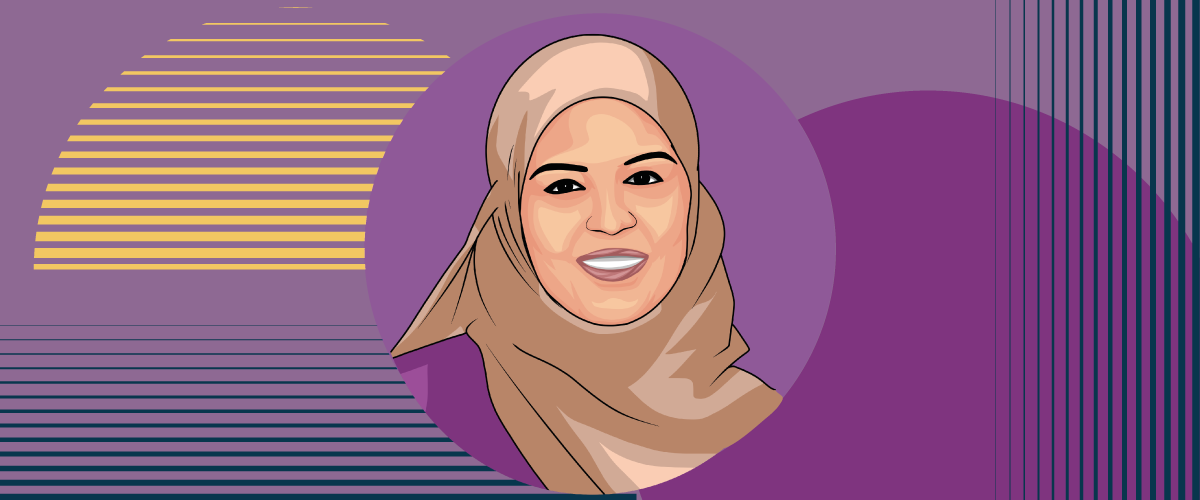
A Seed of Hope — Fauzia Baig
—by Yasmeen Al MomaniFauzia Baig has planted a seed of hope and change in our community to improve it and ensure that everyone can live their life to the fullest. Her inspiration to better our society stems from her childhood experiences and her parents' support —both of whom encouraged her to make her way through life while helping others.
Fauzia’s story started before she was born. It began with her mother, an incredible woman who made the tough journey from India to Toronto in the late 1970s with her husband. This pair faced hardships upon their arrival, such as her father’s change in employment from a research scientist in India to a factory worker in Canada. It was here, in the heart of the metropolitan city of Toronto, that Fauzia was nurtured and shaped. Her environment was multicultural and diverse, and she interacted with many different types of people from different backgrounds and cultures with whom she shared similarities and differences. Despite the struggles that her parents experienced, they shielded Fauzia from the harsh realities of life in a cocoon of love that provided her with a happy childhood. Although she did not grow up with financial wealth, this love and support that surrounded her was a different type of wealth, having a home that was always a safe space. From her childhood, her parents always encouraged her to seek knowledge and build a successful life for her future with no limits on her dreams.
Regardless of her parents’ protection from the adversities that were present, Fauzia’s urban environment still allowed her to see people in her community struggling to have the basic necessities of daily life. From an early age, she saw less financially fortunate families cope with broken households and access to food or clothing, which was her first exposure to the social injustices that people endured in the world.
Fauzia also grew up seeing her mother continuously connect with people and build relationships to support others in the community. She was constantly carrying out acts of kindness and was there for her friends and neighbours, as they were there for her, which is something Fauzia always looked up to and continues to respect today. Bearing witness to social injustices at an early age, coupled with observing what her mother did for others, planted the seed within Fauzia to also want to help people, and be a catalyst for change in society. She believed education would help her to fulfil that, which is what led her to pursue higher education at the University of Waterloo.
The journey from Toronto to Waterloo was a peculiar one. When Fauzia arrived Waterloo had a very different demographic and feel than what she was used to. After she finished her bachelor's degree, she decided to remain here and work for justice and equity within this community. Fauzia believes that everyone should have the ability to live their life to its full potential, and she wanted to be part of the solution to ensure the community was working toward that. She acquired a master’s degree in health promotion, which is what led her to work in the region delivering public health services to people.
In the early 2000s, the Muslim community was scrutinized due to great misconceptions about the Muslim religion, and this has persisted for decades. This impacted Muslim women worldwide, including Fauzia, and it affected how she saw herself. She found herself giving in to society’s perceptions, which was toxic and challenging. She was able to persevere through this period by remembering her parents' belief in her and focusing on her self-esteem. After rising above these stereotypes, Fauzia wanted to play a role in changing how Muslim women were perceived in the community by fostering relationship-building with the larger community.
This is what drew her to the Coalition of Muslim Women (CMW), an organization that empowers women to take an active role in society and build bridges within the community. Their vision appealed to her, and she joined as a member, where she met marvellous women who fascinated her with their passions that were so similar to her own. With their encouragement, she took on more projects and responsibilities within the Coalition and she soon joined the board. Some of the projects that she has coordinated include the Emerging Muslim Women Leadership Training, Salaams K-W Cookie Campaign, Muslim Community Blood Drive and the Give30 Ramadan Food Bank Campaigns. Her passion for diversity and inclusion drives her to build opportunities for Muslim women in Kitchener-Waterloo, bring people together, and work on upstream equity issues while being involved in the CMW.
As a naturally shy person, one of the hurdles that Fauzia overcame in her journey was finding her own voice to speak out and stand with others in her work relating to social justice. The Coalition played a part in helping her channel her feelings of shyness into her passion to put herself out there and use her voice in situations that felt risky or new to her. These experiences helped her grow as a person and be able to speak out against injustices and build relationships with people.
Fauzia soon spread roots in the community by working toward social justice by becoming the co-chair for the mayor's Task Force for Equity Diversity and Inclusion for the City of Kitchener. This role exposed her to many community members who shared her passions and they worked toward developing plans to remove systemic barriers in the structures of society to create change for the betterment of the city. She also became a member of the Equity and Inclusion Advisory Group for the Waterloo Region District School Board to support the diverse youth in the Waterloo Region. For example, through this advisory group, policy changes were made related to booking exams and tests on religious or cultural days of significance. Changing this policy may seem like a small thing, but on a macro level, it impacts the lives of many students who may have previously felt excluded from participating in their spirituality due to exams. It has become more equitable for people of all religions and cultures with diverse celebrations to be able to spend their days of significance surrounded by their families and friends. Policy changes such as this support students and can lead to creating more positive experiences and environments at school.
Something Fauzia realized when she became an adult is that all of the times she witnessed her mother connecting with others when she was a young girl was her first exposure to leadership that builds on relationships in social capital. It is imperative to have social capital in times of hardship so that people have relationships to draw on for support and assistance. Fauzia continues to honour her beloved late mother's memory by being there for her neighbours and friends, and working in organizations that form relationships with people. Her parents sent her into the world with the morals and values to help others, and she continuously fulfills this as she plays a role in strengthening the community so that duriing times of crisis, people are together able to be resilient.
Fauzia’s care for others is personified in a direct quote from her: “I appreciate everyone around me who has supported me, who has extended friendship and been there with me throughout all of the phases in my life. People in life come and go, but everyone has had a place and a purpose and helped me through these phases.”
These words expressing her gratitude to her loved circle of friends and the people she appreciates speaks volumes about her character, as she is someone who has a tremendous passion for social support and building networks in the community, something she has incorporated into her own life as well as the lives of people in the Kitchener-Waterloo community.
The adoration that Fauzia has for her mother and her father is reflected in her own children, who look up to her and feel the same admiration for her that she has for her parents. When she peers into her children’s eyes, she sees two miracles full of inspiration and hopes to continue her journey so that life will be more equitable for the coming generations. Her mother strived to make society better, and Fauzia followed in her footsteps to do the same, and the next generations will continue to do so until one day, people will all be treated equally and with respect and kindness, and be able to reach their maximum potential. Her children are a reminder of the beauty in the world, and she cherishes them deeply.
The seed that Fauzia’s mom helped plant within her to bring people together and fight for equity is a seed that she has carried in the palms of her helping hands and planted into the soil of our community. Fauzia nurtured this seed until it bloomed into a beautiful flower of hope for equity and justice. She has made and continues to make successful changes in the community for the improvement of individual people’s lives on a micro level, and the betterment of society on a macro level.
